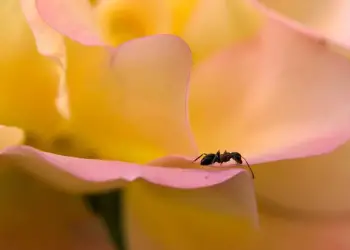Do roses attract ants? Ants are often drawn to rose bushes by the presence of aphids, a pest that has probably already settled itself in the garden. So let’s get into more on why this is the case and what you can do about it.
Roses attract ants because the combination of available nectar and other resources such as aphids makes roses an attractive place to build a nest. Much like other flowers, ants like nectar, and the perfume of the flowers will attract them.
So there is slightly more to it than that, and if you have this issue then you may want to deal with it pretty quick! So let’s get into more details…
Do roses attract ants?
Ants are attracted to a combination of factors. These factors can combine to make nesting beneath a rose an attractive place for ants. Mostly these are concerning the availability of food, and ideal nesting conditions.
But there are things you can do to deter ants, which I’ll go into once I’ve outlined why ants are attracted to roses.
Why ants are attracted to roses
Let’s take a look at some of the reasons why this might be the case.
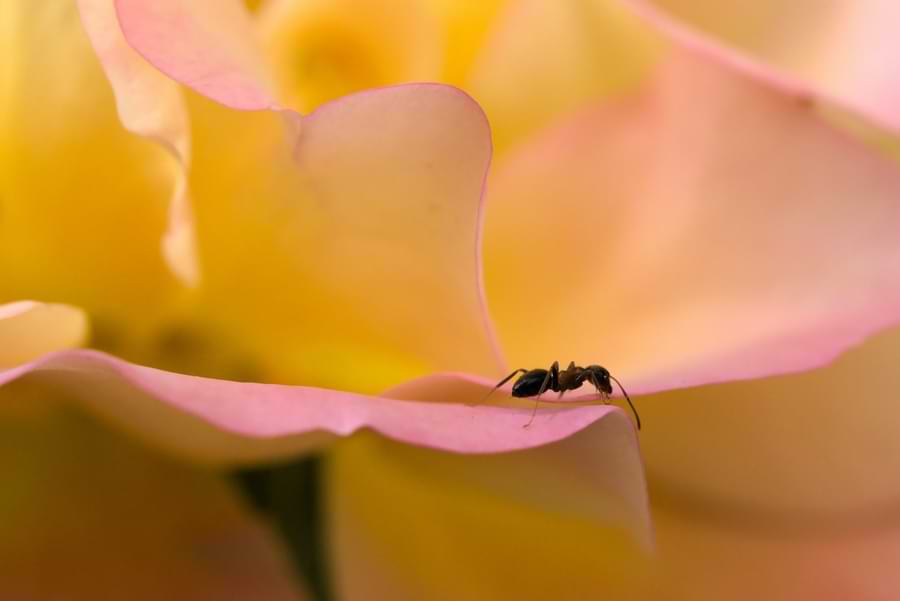
Ants like nectar
Roses produce nectar, which is a sugary substance that ants find irresistible and will seek out.
Ants do not fly, so in order to partake of the sugary food, they need to crawl into the flower of the plant. This makes close proximity to a rose (or other flowers) a much more convenient place.
Ants do not cross-pollinate nearly as effectively as other insects, mainly due to their inability to visit lots of flowers in a short space of time. And because nectar does not as easily stay on their body.
Ants smell the perfume
In addition, ants have a great sense of smell given their size. So ants are attracted to the scent of roses. Being attracted to the scent of flowers means there is a source of nectar.
The combination of these two factors makes roses a very attractive food source for ants.
Availability of other pests
Instinctively, ants will know that where there are plants, there are other pests, such as aphids. Aphids and ants partake in a symbiotic relationship, in which aphids provide ants with honeydew (a sweet, sticky substance) and ants protect them from predators.
Honeydew is a by-product of aphids feeding on plants. It is high in sugar and low in protein, which makes it an attractive food source for ants.
By following the scent of roses, ants are able to find aphids and feed on the honeydew they produce.
Nesting site
Another reason why ants might be attracted to roses is that they provide a good place to build their nests.
Roses offer protection from the elements and predators, the root system particularly provides a loamy soft soil base in which they can burrow. And the thorns on rose bushes can deter some animals from entering the area.
Potential fungus nutrients
It is believed that fungus has evolved to the point of providing ants with certain nutrients. This makes fungus attractive to ants, and so develops another symbiotic relationship in which ants will seek out, and even cultivate fungus.
Ants, therefore, may be attracted to certain types of fungus that are growing on or near your rose bush, one could be black spot disease.
You can take precautions to prevent this from happening. Check out my guide to watering roses for more information on this.
This makes roses an attractive nesting site for ants. But what does this mean for your roses? Are ants bad for rose’s health?
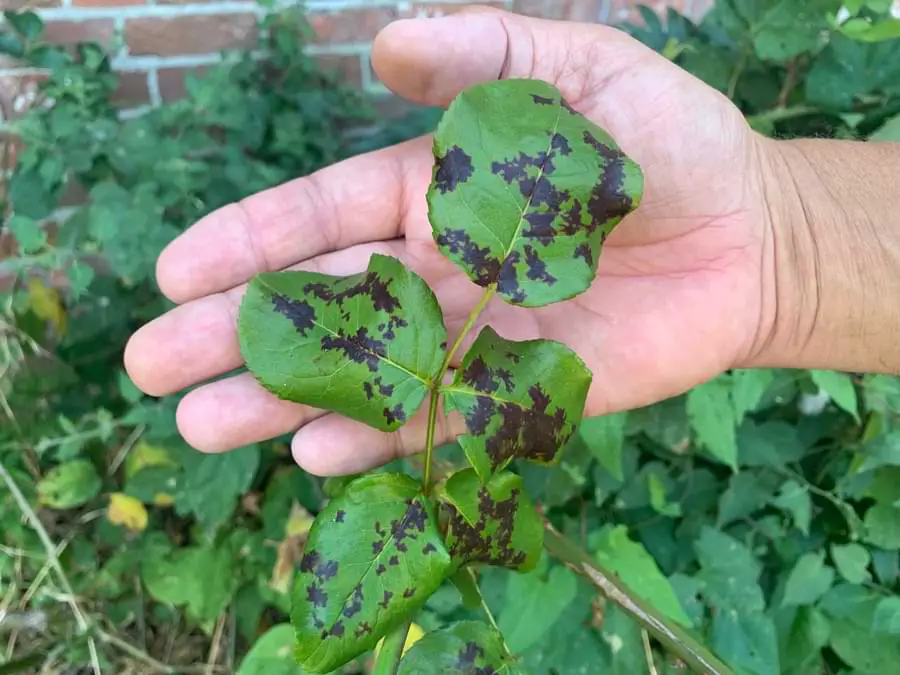
Are ants bad for roses?
While ants do not directly harm roses, they can indirectly cause damage by introducing other, and more pests to the plant.
Aphids are not the only pests that ants will protect; they will also defend mealybugs, scale insects, and whiteflies from predators
Aside from this, ants bite people, which is not great for you or guests viewing your roses. And your rose bush will not look as attractive from an aesthetic point of view with ants crawling all over it.
So if you choose to remove ants from your rose bed, let’s discuss what ways can you remove, and even deter ants from your rose bush.
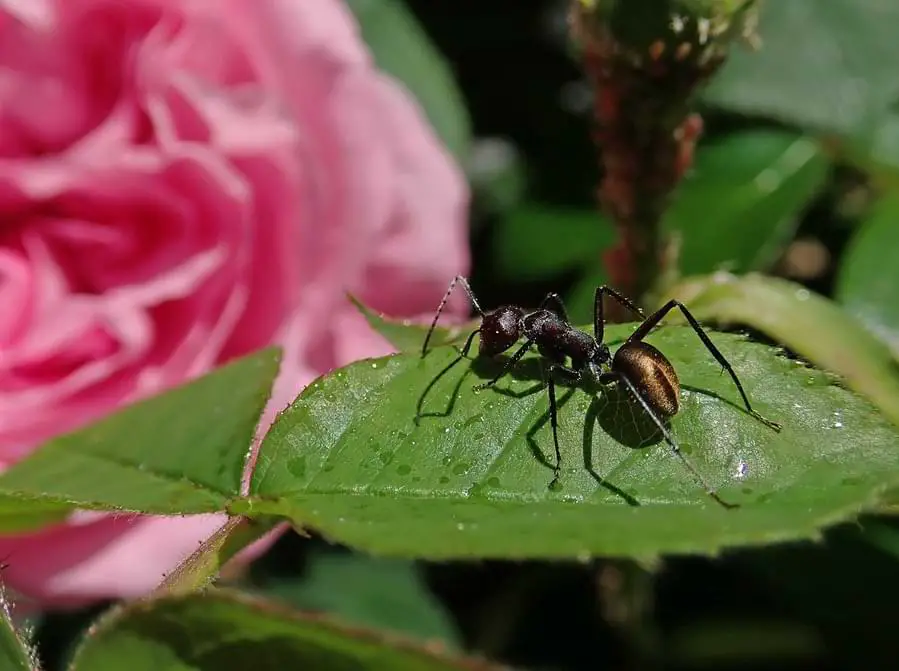
How to remove ants from your rose bush
There are two ways that you can remove ants from your rose bush. The first way is to use a natural remedy, and the second way is to use an insecticide.
Natural remedy
If you want to use a natural remedy, then you can either use sugar water or borax. To make the sugar water, mix one cup of sugar with two cups of water.
Then, pour the sugar water into a spray bottle and spray it on the ants. The sugar will attract the ants and they will drown in the water. To make the borax remedy, mix one cup of borax with two cups of water.
Then, pour the borax mixture into a spray bottle and spray it on the ants. The borax will kill the ants.
Insecticide
If you want to use an insecticide, then you can either use a contact insecticide or a systemic insecticide.
- A contact insecticide will kill the ants that come into contact with it, but it will not kill the eggs. It may however reduce the number of ants able to tend the eggs and effectively starve the colony.
However, this may only encourage them to move elsewhere. If you want to use a contact insecticide, then you can either use a spray or a powder. - A systematic insecticide will kill the ants and the eggs. If you want to use a systematic insecticide, then you will need to use a liquid.
To use a contact insecticide, first, mix the insecticide with water according to the manufacturer’s instructions. Then, spray or sprinkle the mixture onto the ants and their nests. Make sure to get the underside of the leaves as well. Repeat this process every few days until the ants are gone.
How to deter ants from your roses
The trick here is simply to make your rose beds a less attractive proposition for ants. To do this, there are a few actions you can take to prevent ants from infesting your roses in the first place.
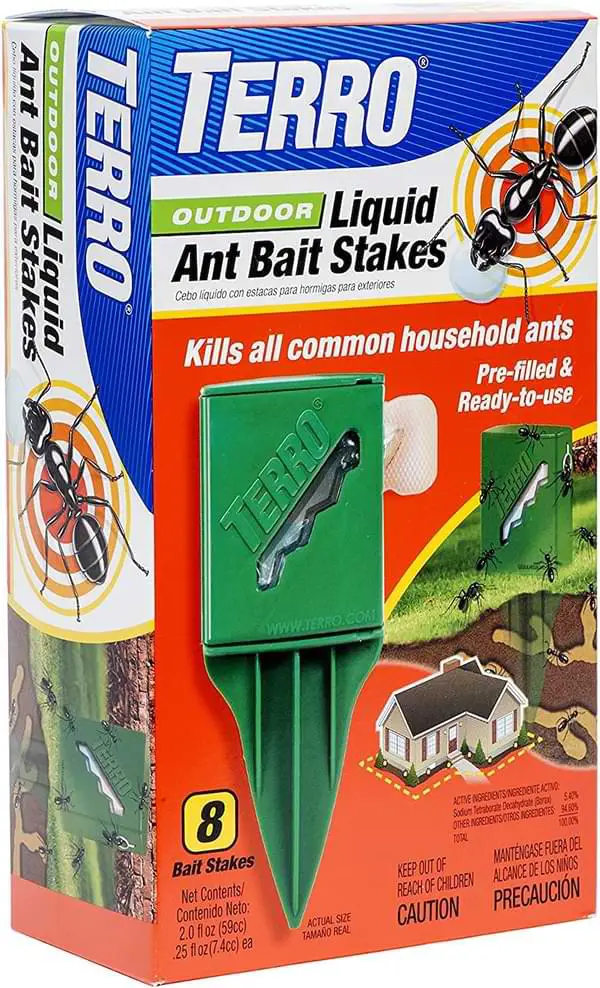
- Ensure you remove any aphid colonies and other sap-sucking pests.
- Add a sprinkling of ground cinnamon or cayenne pepper around trails and common ant areas.
- Add some diatomaceous earth around the ant colony, you can get a bag of that online.
- Set borax (contains boric acid) poison traps, this type works perfectly. Ants will take this poison back to the colony to kill the nest.
- Neem oil-based insecticidal soaps and sprays are another chemical-free option.
- Banana peels placed at the bottom of the rose shrub will repel aphids because they dislike potassium.
- Pour coffee grounds around your roses, or directly on the anthill to help reduce the ant population in your yard. They’ll effectively implode after eating any coffee grounds.
- Surround the rose bushes with grits or cream of wheat. Ants will eat it and then drink water, which will cause the grain to expand and kill them. Spray around plants with a solution of one part vinegar to one part water. Ants will be killed (or at least discouraged) by the acid in vinegar.
- Baking soda, flour, and baby powder are some of the culinary products that will keep ants away from rose bushes. Ants will not cross over if you sprinkle them around the base of the rose bush.
- Try watering your roses in the morning so that the foliage has time to dry before nightfall. This will help to prevent fungal diseases, which can also attract ants.
If you have any potted roses, make sure to inspect them regularly for ant colonies. You can try the methods above to get rid of ants in potted roses as well.
Aphids are a big attraction for ants, and as we rose growers know, aphids really like rose bushes! So I’ll go into that a little more next.
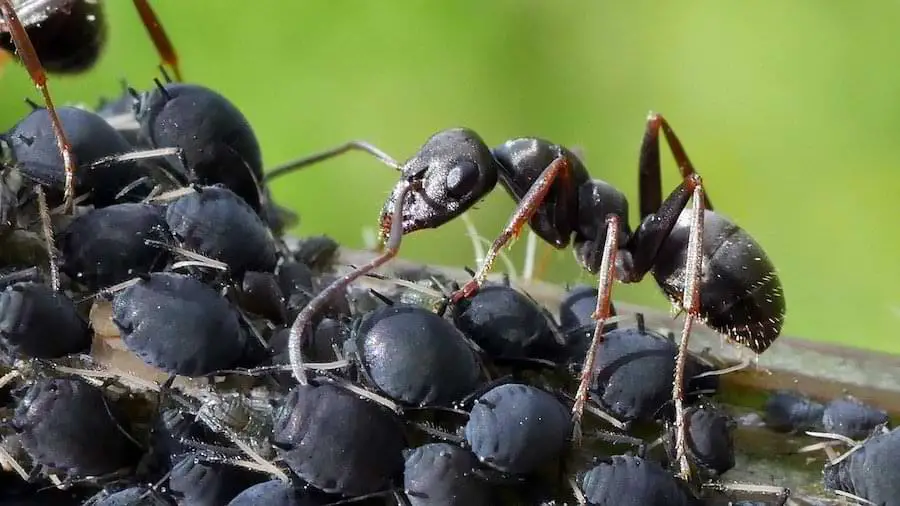
What are aphids?
So do roses attract ants? Or do aphids?
Aphids, or plant lice, are tiny plant-eating insects with rounded pear-shaped bodies.
In almost every environment, they can be readily found on rose bushes. Aphids are the main culprits if your roses develop wrinkled rose buds and puckered, curling new leaves.
A closer look may uncover these green or rose-colored tiny soft-bodied insects with green or pinkish bodies that are feeding on the succulent new growth.
Aphids wreak havoc on roses by piercing through the plant tissue and sucking the plant’s vital juices. I wrote about which types particularly like aphids in my article here.
Soft stems, delicate buds, and fresh leaves are the most common targets. The aphid population can boom, so enough aphids feeding on your roses can cause your fine-looking roses to look strained and deformed within a day or two.
Although one or two aphids may appear small and in no way would impede the plant’s growth, aphid populations grow quickly.
These pests are unique in that they may reproduce without mating. Adult females can give birth to numerous generations of young in as little as one week.
They may take over your rose bushes and other garden favorites in no time. Occasionally, they will produce aphids with wings, these are the scouts sent out to find and populate new plants.
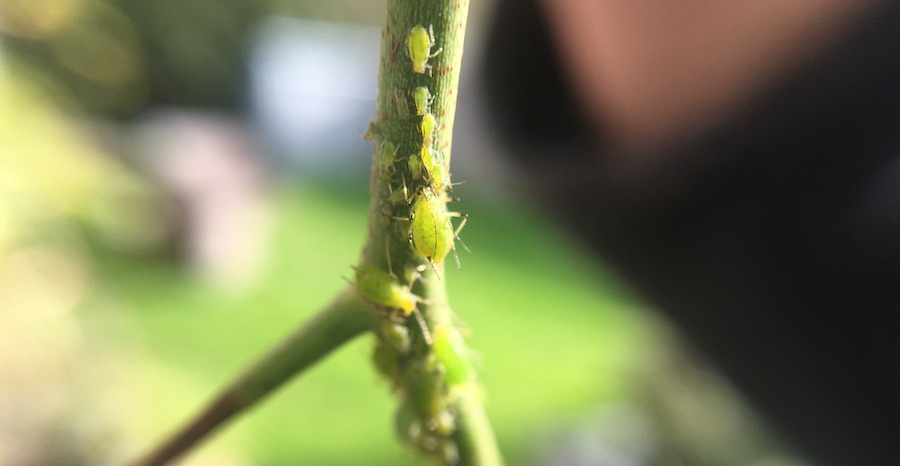
Do ants eat aphids?
Ants do not eat aphids. While they do not intentionally seek out aphid colonies, when they do find them, they will regard them as a precious local resource. Ants will protect the colony, posting ant guards to defend against pests such as ladybugs in what is called a symbiotic relationship. And even care for the aphid eggs in winter to help the aphid colony survive.
Peak activity times
Aphids start to appear on rose bushes in the early spring and stay until the end of June. During this time, keep an eye on your rose bushes …since if the aphids aren’t removed, ant activity is very likely to follow.
Beneficial plants
Beneficial insects that eat aphids will be attracted to both the roses, and to rose companion plants in the garden. White sweet clover, hyssop, spearmint, Queen Anne’s lace, and sunflowers are some of the most effective plants that attract beneficial insects.
Beneficial insects
Ladybugs, parasitic wasps, lacewings, and praying mantis are some of the natural predators of aphids in the garden.
Ladybugs can be acquired at your local garden center if there aren’t many in the garden. During the day, water the garden, then release the ladybugs near the rose bushes in the evening.
Place a canvas over the bush to help retain ladybugs for the short term – allowing enough time for them to find the aphid populations. Releasing in the evening will also make ladybugs want to stay in your garden longer.
Any ant colony can be dealt with more easily once the aphids have been removed from your roses.
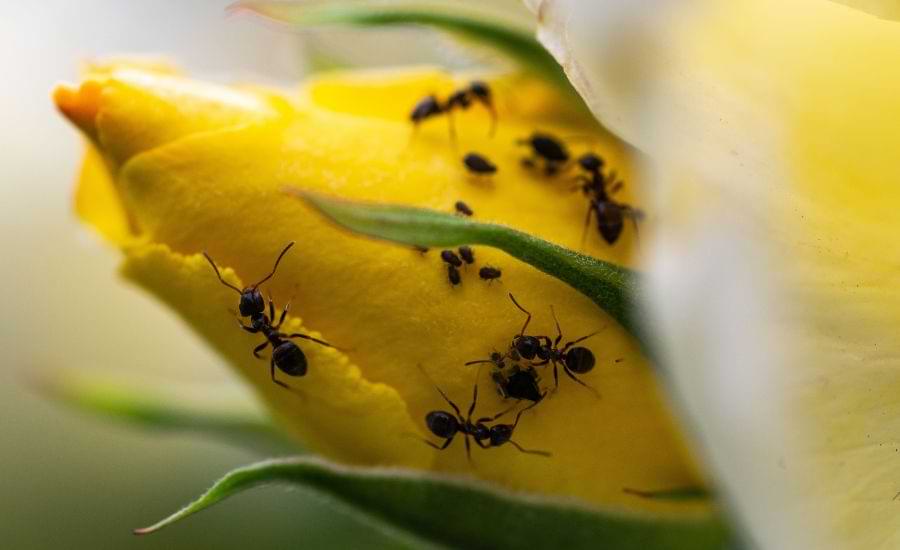
Using boric acid for ants
There are multiple alternatives available to you if you have ant colonies that you want to manage.
The use of boric acid baits is a good least-toxic strategy. Boric acid baits can kill ant colonies in as little as a week.
The goal is to encourage the ants to take the boric acid back to the nest instead of killing them at the bait station, thereby poisoning the colony members within the heart of the nest.
The majority of ants eat sugars, protein, fats, and oils. Place little dabs of jelly and peanut butter (not mixed) where ants are visible and see which food they are attracted to determine which type you have.
If the jelly attracts them, make a boric acid bait by mixing one-half cup jelly, such as apple jelly, with 1 1/4 teaspoon boric acid powder. Punch numerous holes in the jar’s lid, then tightly screw it on and tape it shut. The ants should be able to pass through the holes and reach the bait.
Place the bait jar on its side so that the ants will encounter it. If the ants are unable to acquire footing on the jar lid, use sandpaper or a pebble to scratch the surface.
Use peanut butter instead of jelly as your bait if the ants are drawn to that instead. Reduce the amount of boric acid in the combination if you see a lot of dead ants around the bait station, regardless of which bait you use.
Increase the amount of boric acid if you’re still finding live ants after a week to ten days. Despite the minimal toxicity of boric acid, it is preferable to keep bait jars out of reach of children and pets.
Here are some recent articles similar to do roses attract ants…
Do roses attract ants ~ More roses help 🌹
It might seem like a lot of work and effort, but as gardeners, you’ll know it’s the kind of work you need to go through to protect your hard-earned crop of roses!
I hope this has been useful for you. Be sure to check out related articles such as Do roses attract bees. And check out my tools and resources page so you can grow wonderful roses too!

Hi, I’m Michael. My passion for roses was sparked a few years ago after visiting a dedicated community rose garden. So Rosehow.com represents my take, my learnings, and my help for anyone looking to grow, be proud of, and harvest roses.

